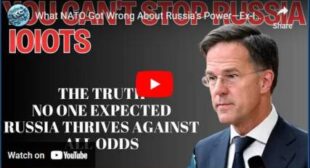
Meanwhile, Russia has not only survived but has reoriented its trade flows, strengthened its alliances with non-Western countries, and solidified its position as a key player in global energy markets. A former Swiss intelligence officer with extensive experience in foreign intelligence operations recently shed light on Russia’s unexpected resilience.
In an eye-opening interview, the officer revealed that the West had fundamentally misunderstood Russia’s strategic capabilities. Rather than collapsing under pressure, Russia has thrived under the sanctions and trade restrictions imposed by over 50 countries. Russia has reestablished its economic strength, even surpassing Germany in GDP, and has made significant technological advancements in fields like nuclear energy and hypersonic missile technology.
Moreover, the sanctions aimed at Russia’s energy sector have led to a global supply shortage, driving up prices and benefiting Russia economically. Europe, particularly, has felt the brunt of these price hikes, as the sanctions on Russian energy resources were not carefully considered. Contrary to Western expectations, the Russian people have not turned against their government but have instead rallied behind it, showing remarkable patriotism in the face of adversity.
The Western strategy of isolating Russia has backfired, and instead, Russia has successfully built stronger relationships with countries in the Global South, including China, India, and nations in the Middle East.
This shift in global alliances has empowered Russia to emerge as a leader in a new multipolar world, challenging the dominance of Western institutions. As Russia strengthens its ties with emerging economies, it is becoming increasingly clear that the West’s approach to Russia has failed, and the global energy landscape has shifted irreversibly.
